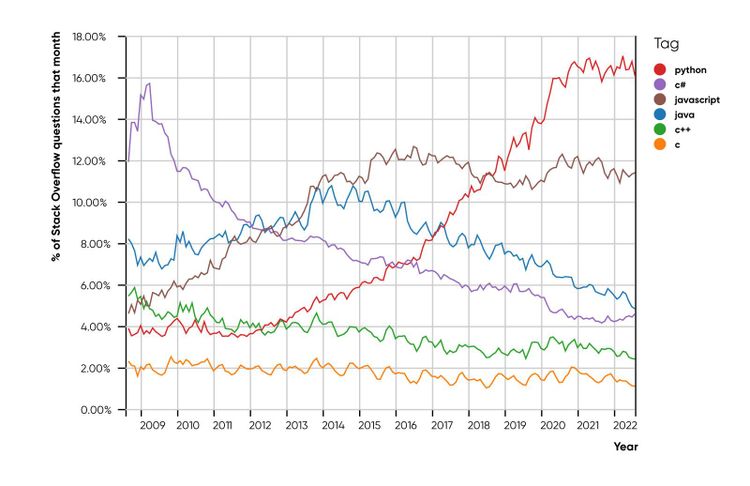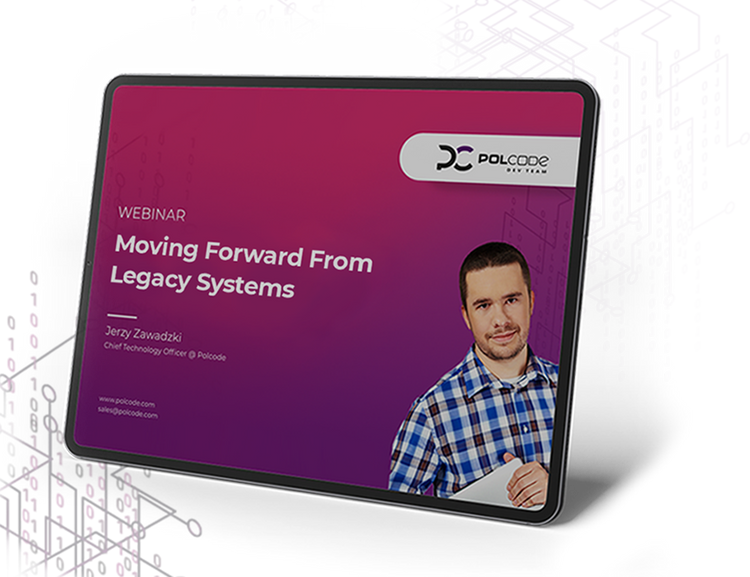
FinTech startups are quite a specific place in the IT industry. FinTechs differ from other startups in that they emphasize security and stability, as well as development and maintenance time. And while they can enjoy the freedom to choose the latest and greatest technologies, they often need to settle on a solution that is reliable and sustainable over the long term.

FinTech Startups – Where Python Conquers Java
FinTech startups are quite a specific place in the IT industry. FinTechs differ from other startups in that they emphasize security and stability, as well as development and maintenance time. And while they can enjoy the freedom to choose the latest and greatest technologies, they often need to settle on a solution that is reliable and sustainable over the long term.
Java Proudly Wears the Shoes
Java has been bravely fulfilling these requirements for a long time (and still does so now). No wonder. Java is reliable, secure and comprehensive. It offers many features that make writing code simple and straightforward. Therefore, Java is simple to learn and due to its object-oriented nature, it easily solves complex problems through modularity and code reuse. In addition to that, Java has been around for quite some time; therefore, finding Java developers with 15+ years of experience is not a very difficult task.
It seems clear that it is Java that occupies the first place in the FinTech startup field. However, for several years it has been observed that more and more FinTech startups (but not only) are leaning towards Python to implement their IT solutions. Could that possibly mean that Java is getting old?
… Are Java Shoes Old?
Java is a proven, reliable technology, not the hip new latest thing on the block – but that doesn’t mean it is a bad thing. The biggest drawback is that a lot of Java projects use pretty outdated/legacy tech. Also, a boring and proven technology is what businesses want, which leads to Java jobs being present in a very corporate environment.
Python Wears Sneakers
Python is rapidly growing in popularity among programming languages not only in FinTech. Based on Stackoverflow, during the last decade, monthly views of questions related to Python programming have quadrupled, and since 2018 they took the lead in the questions view chart. On the other hand, we can spot a loss of interest in questions related to Java dating back to 2014.

Source: Stack Overflow Trends
Java is generally faster and more efficient than Python because it is a compiled language (while Python is an interpreted language). On the other hand, Python has a simpler, more concise syntax. It can perform the same function as Java in fewer lines of code.
Sneakers vs Moccasins Race – Why Betting on Python May Pay Off?
Here are a couple of reasons why Python might be considered a good choice for FinTech startups:
1. Development Speed
Sometimes you want to start your development by making a mock-up to see how your product will perform before you decide on the specific technology. Building an MVP with medium-quality code is a very good approach – at least with Python. Building an MVP in Java can take months, while in Python you can do it in a matter of weeks.
Going further, Java projects usually take years. A year-long project in Java is still considered a small one, while with Python it is perfectly normal to have projects that require only months of work.
Java usually requires larger development teams. Python can do with fewer programmers, and sometimes even one is enough, which helps to lower the overall cost of the project.
In Java, there is a clear learning curve and the starting point is high. It takes a long time to start writing and learning about it, and each API is a different story.
Python is more cost-effective than Java, which is why small and medium-sized projects may prefer to code in it. In most cases, this is a perfect choice. Java programming requires a big budget and a lot of time – it's a big investment all around.
2. Mathematics and trending capabilities
Python has no equal when it comes to trending technologies. It offers numerous tools for data science, AI and machine learning, which greatly help FinTech. Python's simple architecture fits perfectly with AI. Its simplicity and libraries give it the necessary advantage over other programming languages to successfully design the complex internal logic of machine learning.
Python is able to process huge amounts of data and offers an extensive toolbar for this. Doing the above in Java would require a lot more code, slowing development and losing focus on the task in the process.
FinTech solutions normally handle numerous different mathematical operations at once, which makes building software capable of that a challenge. Python is probably the winner for math calculations. It has long become the most used tool among mathematicians and data scientists due to its rapid value parameter assignment, numerous math libraries and ease of use.
It is relatively easy to integrate economic calculations into Python-based platforms as opposed to languages such as Matlab or R.
Some of the most popular Python libraries for the FinTech industry include:
- NumPy: used for scientific computing, data science and statistics. It has a multidimensional container for generic data, additional linear algebra, Fourier transform, and random number capabilities;
- Pandas: used for data analysis manipulation capabilities;
- Pyalgotrade: used for algorithmic trading. It is especially useful for paper trading, live trading, predictive analytics in trading and stockbroking;
- FinmarketPy: used for backtesting trading strategies and analyzing financial market data;
- SciPy: used for integrating AI and machine learning in FinTech products;
- PyFolio: used for analyzing performance and risk of financial portfolios.
3. Web services
These are many popular high-level frameworks for Python. Django and Fast-API should be especially distinguished.
Python and Django work great together in ensuring coding speed and the availability of data tools. With the Django framework, you do not have to write all the code from scratch. For example, there are many reusable chunks for authorization and management tools. This allows Python developers to get over simple tasks quickly and concentrate more on essential and complex parts of your software.
Fast-API is the younger brother of Flask Web Framework. Released in 2018, it was designed to aim for building fast web applications and Rest API. In fact, Fast-API is known as one of the fastest Python web frameworks. Fast-API offers an extremely handy automatic documentation system. It provides a browser-based user interface that interactively documents an API, powered by Swagger UI GUI.
Hosting any REST API over Python is a simple and pleasant task.
4. Security
In an industry such as financial services, all software must meet stringent architecture, quality, and security requirements. In addition, it must comply with international and local laws and regulations. Needless to say, the product must gain the users’ trust by ensuring a reliable experience.
In Python, it is very easy to create authorization levels or implement encryption. There are tons of libraries and solutions to increase the security of Python applications.
Python solutions help you defend yourself against common web application security problems that are in the top ten of OWASP. But then you can go far beyond both in scope and detail, making your software prepared for the forces of the dark side.
Summary
We have discussed some of the reasons why Python can be seen as “gaining interest in the FinTech world". But is Python actually taking over Java’s large chunk of the software development market? Does this mean that we may soon see the day when one language prevails and the other is forgotten?
The battle will certainly go on for many years and its outcome is unknown. But, assuming that Python's current trends continue and the language becomes more and more popular, one thing is for sure: Python is the future!
Which side are you on?
On-demand webinar: Moving Forward From Legacy Systems
We’ll walk you through how to think about an upgrade, refactor, or migration project to your codebase. By the end of this webinar, you’ll have a step-by-step plan to move away from the legacy system.

Latest blog posts
Ready to talk about your project?
Tell us more
Fill out a quick form describing your needs. You can always add details later on and we’ll reply within a day!
Strategic Planning
We go through recommended tools, technologies and frameworks that best fit the challenges you face.
Workshop Kickoff
Once we arrange the formalities, you can meet your Polcode team members and we’ll begin developing your next project.

